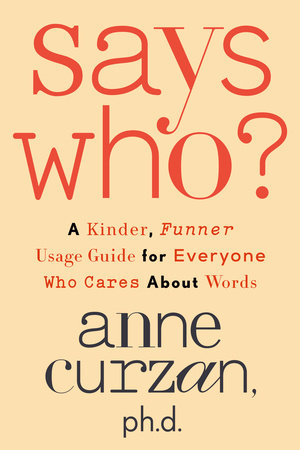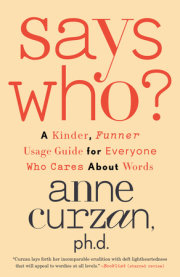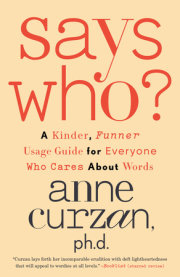Introduction The wedding was at a swanky hotel in Boston, and I was early. I picked up my table card and was milling about before the ceremony in a little black dress and higher heels than I can mill about in comfortably. Unable to find anyone I knew nearby, I introduced myself to a friendly-looking couple about my age with a ten-year-old boy who was not-so-subtly trying to loosen his necktie. After exchanging pleasantries, the mother and I turned to questions about what we each did professionally. She worked as an editor, and when she learned that I study the history of the English language and that I was writing a usage guide, her face lit up. “Oh, you’re my new best friend!” she exclaimed. “I have so many questions for you. We could talk for hours!”
It’s a well-kept secret that being a grammar geek can occasionally be good for your social life.
My new best friend went on, “Okay, let’s start with
impact as a verb. I can’t stand that! What do you think?”
I paused, knowing that the conversation was about to get dicey. “Listen,” I replied, “I get it. My pet peeve is the adjective
impactful—it sounds like nails on a chalkboard to me. But, honestly, I think we’re both going to have to stand down.
Impact is a verb and there’s nothing grammatically wrong with
impactful. And, clearly, lots of other people think these words are useful.”
I tell this story to highlight that almost all of us notice things in the English language that we wish, well,
weren’t in the English language. There are some peeves that are widely shared, such as impact as a verb to mean ‘affect,’ and there are others that seem to be idiosyncratic: For example, I regularly get emails from an astute language observer who is concerned about the spread of the preposition
toward into expressions such as
dismissive toward and
express gratitude toward. I hadn’t noticed this linguistic phenomenon until he pointed it out—and, for what it’s worth, I have no strong feelings about it.
As far as I can tell, it is human nature to notice language, both consciously and unconsciously. We make a mental note of some of the new words and new bits of grammar that we hear and see around us, exactly because they are novel. And when we travel to new regions and/or meet new people, we can’t help but observe some of the differences we hear in the language. Some of us may notice when speakers don’t follow a so-called rule that we learned from a trusted language authority. I’m all for this kind of noticing: It shows our fundamental curiosity about how language works—how it varies from speaker to speaker and how it changes over time.
A key question for all of us then to consider is what we do with our observations. Do we feel compelled to judge that new word or usage as illegitimate? Or do we congratulate ourselves on spotting a new word or bit of grammar? Should we jump in and correct someone when we think they made a grammatical mistake? Or should we stand back and admire how language changes and evolves right before our eyes?
If you care about words—like I do and, as someone who picked up this book, you do—you probably have an inner
grammando. The new word grammando was introduced in March 2012 in Lizzie Skurnick’s feature “That Should Be a Word” in
The New York Times Magazine. Here’s her definition:
Grammando: (Gruh-MAN-doh), n., adj. 1. One who constantly corrects others’ linguistic mistakes. “Cowed by his grammando wife, Arthur finally ceased saying ‘irregardless.’”
Clever and evocative, the word
grammando strikes me as an excellent alternative to both
grammar stickler and grammar Nazi. If we’re going to talk about Nazis, let’s talk about Nazis. If we’re going to talk about people who correct other people’s grammar, let’s talk about grammandos (even though the word is not yet accepted by the spellchecker that is checking my spelling as I write this).
There’s another new word—
wordie—that captures the alternative to being a grammando. Added to the
Merriam-Webster Dictionary in 2018,
wordie describes someone who delights in language’s shifting landscape. Wordies know the language rules and where they come from, and then they make informed calls about whether or not to follow the rule in a given context. Wordies are the skilled bird-watchers of language, taking pleasure in observing how different speakers creatively deploy the language and how language is changing.
Given that you’ve chosen to read a usage book with the word
funner in the title, you almost certainly have an inner wordie who lives alongside your inner grammando. Welcome to my world! When I notice a new species in the language out in the wild (metaphorically speaking) and have an urge to stamp it out—that’s my inner grammando talking. When I delight in learning from young people about the rules of texting and new slang, my inner wordie has the upper hand.
We all have our language peeves—those bits of language that grate on our nerves and that make us want to pull out a red pen while reading or stop someone midsentence to go grammando on them. (Yes,
them—see chapter 18 for an explanation of how
they can be singular.) And the question at any one of these peevey moments is whether to let our inner grammando say anything or let our inner wordie carry the day. This book will help you sort out when your inner grammando might have useful guidance and when your inner wordie should override concerns that something’s “wrong.” Believe me, I have had lots of practice.
My mother was a grammando when I was growing up. I was taught to say “This is she speaking” on the phone when someone called for me, and it was certainly “He is shorter than I,” not “He is shorter than me.” You are well, not good, and you drive slowly, not slow. I spent many an evening at the kitchen table nervously watching my mother, a trained editor, poring over my school papers and marking up grammatical missteps. I am to this day a meticulous copy editor, noticing every comma and inconsistency in usage.
As my sisters and I got older, this attention to grammar became more endearing than frightening, and one of our favorite family stories involves a moment when my mother’s inner grammando got the better of her at, of all places, a wedding. My older sister’s wedding, in fact. It was the rehearsal dinner, and, in the middle of her toast, my younger sister let slip out of her mouth the phrase “for my husband and I.” From the back of the room, my mother interjected, “And me!”
We all laughed, and I’ve gotten a lot of mileage out of this story in my career as a linguist. But this kind of public grammar policing can be cringeworthy. And silencing. Think about a moment when you had your language corrected in front of other people and how that felt. Or even a moment when someone pointed out something about your language such that you became self-conscious about it. In my second year of graduate school, I was studying regional variation in American dialects, and I learned about what linguists call “positive
anymore”: the use of
anymore in a positive declarative to mean ‘nowadays.’ As an East Coaster, I don’t do this; I use
anymore only in a negative declarative such as “I don’t eat red meat anymore.” Shortly after reading about this largely Midwestern construction, I was talking to a triathlete friend about how he could find everything he needed at the local superstore, and he said, “They sell energy bars there anymore.”
I perked right up and exclaimed, “You’re a positive
anymore speaker!”
He looked like a deer caught in the headlights, suddenly unsure how to continue talking with a person who seemed to be listening more to his word choice than to what he was saying. Despite my obvious enthusiasm for how he spoke, the conversation ended quickly and awkwardly.
I learned an important lesson about the power of grammatical knowledge from that conversation. And I wasn’t even going grammando on him! I was excited to hear this novel dialect feature (that is, novel to me) out “in the wild,” and I didn’t mean to make him feel uncomfortable about his language. But I had. Language is deeply personal and fundamentally social. We use it to express ourselves and connect with others—and to push them away. Our language says a lot about who we are and where we come from, so when we point out something about other people’s language, it is almost impossible for the comment not to feel personal.
Copyright © 2024 by Anne Curzan. All rights reserved. No part of this excerpt may be reproduced or reprinted without permission in writing from the publisher.









